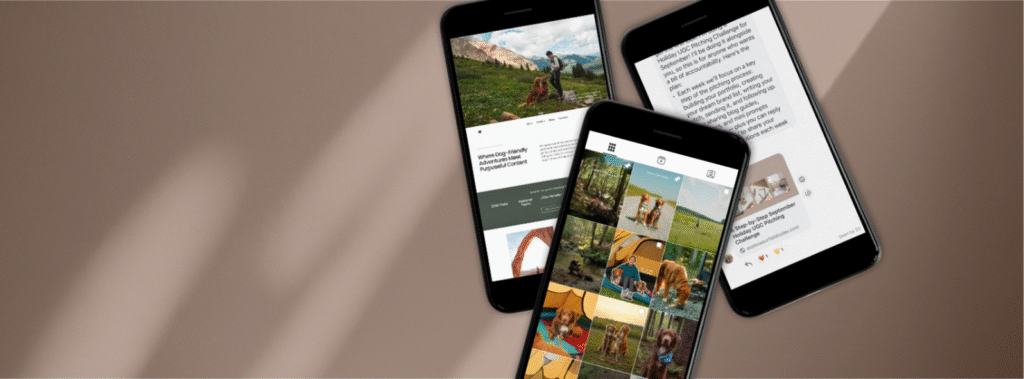Here’s the full story that inspired this blog post. When I first started my pet Instagram account, I hoped that I’d be like other pet influencers that received products from brands (no shame in admitting that).
When I got my first gifted partnership DM, I was so excited. I didn’t even know the brand but when they asked to send me free products in exchange for a video, I immediately said yes. They sent me 2 bags of treats and I posted a video of my dog eating the treats on my account.
Fast forward three years later… and I got a notification that the brand reposted my video. They credited me in the caption (which I’m sure took effort because my handle has since changed) but it made me realize something I wish I’d known early on before collaborating with brands: the hidden cost of perpetuity.
This is the video that they remixed 3 years later.
What is Perpetuity (Full Rights)
In brand contracts, perpetuity means “forever.” You agree to give the brand the right to use your content, your likeness, your voice forever. That means they can use the content however they like, without giving you credit, even years after the original campaign ends.
Going back to my story, I didn’t think anything of it at the time because I didn’t understand the value of perpetuity.
How Perpetuity Can Cost You
When you’re just starting out, it feels harmless – you’re excited to build your portfolio and it’s validating to know your efforts are getting noticed by brands. But giving full rights of your content away can cost you a lot.
Money
The most obvious cost of full rights is money. Agreeing to hand over full rights to your content can cost you $$$ in the long term.
Here’s an example scenario: You collaborate with a brand and post a video highlighting their product. You agree to give them full rights to your content in exchange for the product and a $100 fee for posting the reel to your account. Your video performs well after posting and successfully increases the number of product purchases. They thank you and you part ways after the partnership ends.
The video performed so well that the brand decides to repurpose that video and repost it the next year. The video performs well again and leads to another increase in sales. This time, however, they don’t need to pay you or credit you because you turned the rights over to the brand. You could have earned more had you charged usage rights on a yearly basis and additional money for paid media.
This example is why I now say no to most gifted partnerships or low paying offers that ask for full rights. In my case, I wish I had said no because the cost of owning my content is worth a lot more than a couple bags of free treats.
Reputation
Giving up rights to your content can also put your reputation at risk. In 2025, conscious consumerism drives how brands build trust while also increasing their revenue. People demand transparency and accountability from the brands they choose to spend their money on. On the flip side, people refrain or boycott a brand when they disagree with a brand’s practices or trust is lost.
Take Target for example. Target’s sales and shares in 2025 are still suffering after the backlash they received from caving to political pressure to scale back DEI initiatives in Q1.
Hypothetically, let’s say you partnered with Target a few years back when you were a smaller account and agreed to perpetuity. Fast forward to today, you have amassed a large following and one of your main content pillars is to promote conscious consumerism.
Target is feeling the pain from public backlash and decides to repost your content to their social media account. They can still use your likeness and voice to improve their brand image (even if you personally don’t support them anymore) because you gave them forever rights to your likeness and voice.
Knowing what I know now, I counter all full rights requests with a set timeframe of 12 months. In my story, I don’t even feed my dogs these treats anymore but they’re still able to imply that I do.
Content
Perpetual rights can limit how you use your own content down the road. In some cases, once you create a clip for a brand partnership, that footage technically belongs to them. You can’t repurpose or reuse it for other projects until your agreement ends. Losing that flexibility can limit future collaborations and your creative control.
I’ve also come across contracts that state the brand fully owns the content, which means you can’t include it in your own portfolio or self promotion. I always ask for this to be removed from the agreement.
While the video I created for this previous partnership isn’t one I can repurpose, I do wish I knew just how valuable content is.
So What Now?
Don’t feel bad if you’ve already given up rights to your content to a handful of brands. Now that you know what perpetuity actually costs you, here are ways you can protect yourself better moving forward.
Say No More Often
I say no to 90% of the brands that reach out to me offering gifted collabs or refuse to remove perpetuity without agreeing to pay more. The cost of creating content that can be used forever in exchange for treats or gear is simply not worth it.
Ask Questions Before Agreeing
When I was starting off, I felt like I was being difficult for asking questions. I didn’t want to scare off brands. Now, I make sure to ask questions about usage rights and budget to help make sure the outcome is fair for both the brand and the creator. Some brands will ghost for asking questions but trust me when I say, you’re better off without that partnership. No agreement = no partnership.
Charge the Brand for Full Rights OR Negotiate Usage Rights
If you are willing to agree to a brand’s request for full rights, make sure you are getting paid what you deserve.
Here’s an example of what that might look like. At a minimum, you should be multiplying your base rate by 100-200% and adding that to the total:
$300 (base rate) + $600 (full rights) = 900$ total
Full rights is expensive because you’re giving brands rights to your likeness forever!!!
Realistically, most brands don’t have the budget to pay for full rights in exchange for one piece of content. Instead of sending a large total and getting ghosted, offer 12-24 months usage rights instead. More on handling brand responses in this post.
If the brand refuses to limit usage to 12-24 months or pay the total for full rights, I will kindly decline the deal and ask that they keep me in mind should a budget be allocated for future campaigns.
The Lesson I Learned
I don’t regret working with that brand. It was my first exposure to the world of content creation and a learning experience. It taught me an important lesson: partnerships (gifted and paid) should still respect your creative value.

